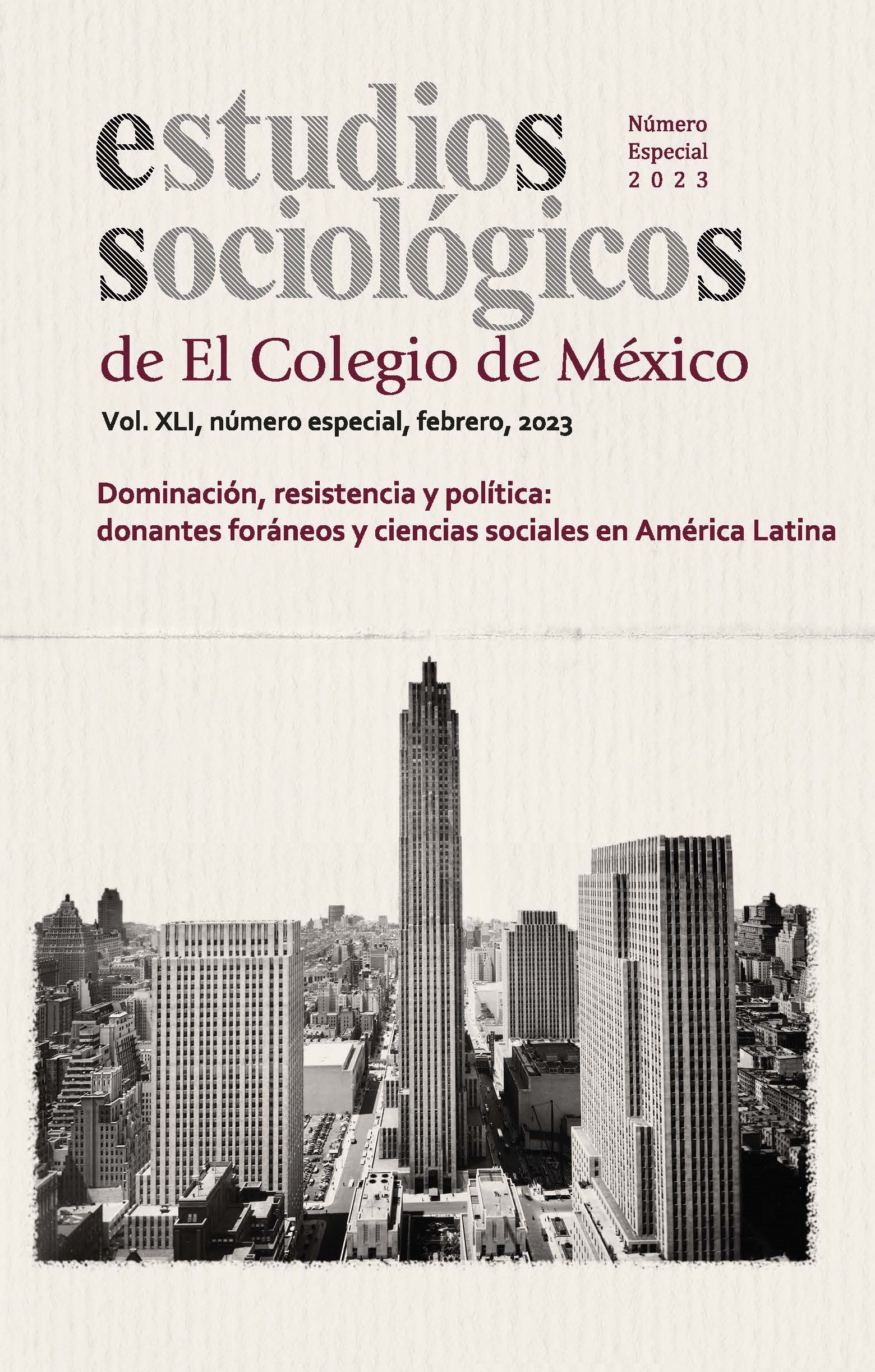La economía política de la investigación en ciencias sociales en América Latina
DOI:
https://doi.org/10.24201/es.2023v41nEspecial.2394Palabras clave:
ciencias sociales, financiamiento extranjero, economía política de la investigaciónResumen
Este artículo explora la variación entre países en el financiamiento para investigación de ciencias sociales a través de un análisis de nuevos datos bibliométricos y de una encuesta en Argentina, Colombia y Perú. Identificamos tres modelos distintos de investigación que dependen de cuál forma de financiamiento –extranjera, pública-nacional o privada-nacional– sea la dominante. Encontramos que cada modelo – “patrocinado por extranjeros,” “patrocinado por el estado” y “economía mixta” está asociado a distintos patrones de acceso al financiamiento, de tipo de conocimiento producido, y de percepciones de parte de investigadores sobre su grado de autonomía.
Descargas
Citas
Altman, David (2012). Where is Knowledge Generated? On the Productivity and Impact of Political Science Departments in Latin America. European Political Science, 11(1), 71–87. DOI: https://doi.org/10.1057/eps.2010.82
Angel‐Urdinola, Diego, Takeno, Taizo, & Wodon, Quentin (2008). “Student Migration to the United States and Brain Circulation: Issues, Empirical Results, and Programmes in Latin America.” En Solimano, Andres (ed.), The International Mobility of Talent: Types, Causes, and Development Impact. (pp. 168-201). Oxford: Oxford University Press. DOI: https://doi.org/10.1093/acprof:oso/9780199532605.003.0007
Atrio, Jorge (2006). Conicet. Buenos Aires: Edición Nacional.
Bay, Kelly, Perla, Cecilia, & Snyder, Richard (2015). Who Sets the Intellectual Agenda? Foreign Funding and Social Science in Peru. En Tanaka, Martin, & Dargent, Eduardo (eds.), ¿Qué implica hacer ciencia política desde el sur y desde el norte? (pp. 99-118). Lima: Pontificia Universidad Católica del Perú.
Beigel, Fernanda (2021). A Multi-scale Perspective for Assessing Publishing Circuits in Non-Hegemonic Countries. Tapuya: Latin American Science, Technology and Society 4(1): DOI: 10.1080/25729861.2020.1845923 DOI: https://doi.org/10.1080/25729861.2020.1845923
Beigel, Fernanda, & Gallardo, Osvaldo (2021). Productividad, Bibliodiversidad y Biolingüismo en un Corpus Completo de Producciones Científicas. Revista Iberoamericana de Ciencia, Tecnología y Sociedad 16(46): 41-71.
Cardoso, Fernando Henrique, & Faletto, Enzo (1979). Dependency and Development in Latin America. Berkeley: University of California Press. DOI: https://doi.org/10.1525/9780520342118
Chernhya, Lachen, Sierra, Jazmin, & Snyder, Richard (2012). Globalization, Money and the Social Science Profession in Latin America. Latin American Studies Association Forum 43(4), 3-6.
Doyle, David (2015). Remittances and Social Spending. American Political Science Review, 109: 785-801. DOI: https://doi.org/10.1017/S0003055415000416
Freidenberg, Flavia, & Malamud, Andrés (2013). Politólogos on the Run: Contrasting Paths to Internationalization of Southern Cone Political Scientists. Latin American Politics and Society, 55(1), 1-21. DOI: https://doi.org/10.1111/j.1548-2456.2012.00181.x
Giraudy, Agustina, Moncada, Eduardo, & Snyder, Richard (eds.) (2019). Inside Countries: Subnational Research in Comparative Politics, Cambridge: Cambridge University Press. DOI: https://doi.org/10.1017/9781108678384
Heller, Patrick., Rueschemeyer, Dietrich, & Snyder, Richard (eds.) (2009). Dependency and Development in a Globalized World. Studies in Comparative International Development, 44, 287-295. DOI: https://doi.org/10.1007/s12116-009-9055-y
Kohli, Atul (2004). State-Directed Development. Political Power and Industrialization in the Global Periphery. New York: Cambridge University Press. DOI: https://doi.org/10.1017/CBO9780511754371
Kono, Daniel Yuichi, & Montinola, Gabriella R. (2009). Does Foreign Aid Support Autocrats, Democrats, or Both? The Journal of Politics, 71, 704-718. DOI: https://doi.org/10.1017/S0022381609090550
Mosely, Layna (2000). Room to Move: International Financial Markets and National Welfare States. International Organization, 54(4), 737-773. DOI: https://doi.org/10.1162/002081800551352
Rivera, Mauricio, & Salazar-Elena, Rodrigo (2011). El Estado de la Ciencia Política en México: un Retrato Empírico. Política y Gobierno, 18(1), 73-108.
Sides, John (2015). Why Congress should not cut funding to the social sciences.10 de junio. Blog. Consultado el 26 de julio de 2016. https://www.washingtonpost.com/blogs/monkey-cage/wp/2015/06/10/why-congress-should-not-cut-funding-to-the-social-sciences/.
Stallings, Barbara (1990). The Role of Foreign Capital in Economic Development: A Comparison of Latin America and East Asia. En Gereffi, Gary, & Wyman, Don (eds.), Manufacturing Miracles: Patterns of Development in Latin America and East Asia. Princeton: Princeton University Press. DOI: https://doi.org/10.1515/9781400862030.55
Tanaka, Martin, & Dargent, Eduardo (eds.) (2015). ¿Qué implica hacer ciencia política desde el sur y desde el norte? Lima: Pontificia Universidad Católica del Perú.
Ubfal, Diego, & Maffioli, Alessandro (2011). The Impact of Funding on Research Collaboration: Evidence from a Developing Country. Research Policy 40, 1269-1279. DOI: https://doi.org/10.1016/j.respol.2011.05.023
Whitley, Richard (2010). Reconfiguring the Public Sciences. En Whitley, Richard, Glaeser, Jochen, & Engwall, Lars (eds.), Knowledge Production: Changing Authority Relationships in the Sciences and their Consequences for Intellectual Innovation (pp. 3-47) Oxford: Oxford University Press.
Whitley, Richard; Gläser, Jochen, & Laudel, Grit (2018). The Impact of Changing Funding and Authority Relationships on Scientific Innovations. Minerva 56(1), 109-134. DOI: https://doi.org/10.1007/s11024-018-9343-7
Wibbels, Erik (2006). Dependency Revisited: International Markets, Business Cycles and Social Spending in the Developing World. International Organization, 60(2), 433-469. DOI: https://doi.org/10.1017/S0020818306060139
Publicado
Cómo citar
-
Resumen873
-
PDF192
-
XML10
Número
Sección
Licencia

Esta obra está bajo una licencia internacional Creative Commons Atribución-NoComercial-SinDerivadas 4.0.
Las personas autoras que tengan publicaciones con esta revista, aceptan los términos siguientes:
a) Conservarán sus derechos de autoría y garantizarán a la revista el derecho de primera publicación de su obra, el cuál estará simultáneamente sujeto a la Licencia de reconocimiento de Creative Commons que permite a terceros compartir la obra siempre que se indique su autor y su primera publicación esta revista.
b) Podrán adoptar otros acuerdos de licencia no exclusiva de distribución de la versión de la obra publicada (p. ej.: depositarla en un archivo telemático institucional o publicarla en un volumen monográfico) siempre que se indique la publicación inicial en esta revista.
c) La persona autora sólo podrá difundir la obra hasta terminado el proceso de envío y dictaminación con el propósito de preservar el anonimato a los pares que lo evalúan.






